|
|
|
Sort Order |
|
|
|
Items / Page
|
|
|
|
|
|
|
| Srl | Item |
| 1 |
ID:
147394
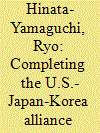

|
|
|
|
|
| Summary/Abstract |
Given the fluid nature of the security environment in the Asia-Pacific, a trilateral security partnership among the United States, Japan, and the Republic of Korea (ROK) is essential to enhance stability in the region. Yet both Japan and the ROK are currently experiencing transitions, as well as facing strategic perception gaps and political difficulties in the bilateral relationship that need to be reconciled. The purpose of this paper is to examine the prospects and issues in establishing a Japan-ROK security partnership to the U.S. alliance triangle. The paper promotes a capability-based cooperation framework for the United States, Japan, and the ROK, focusing on the strategic and operational dimensions that would effectively deal with the security risks in the Asia-Pacific region and beyond. The paper will first outline the developments in Japan-ROK security relations, and then look at the constraints and restraints in the bilateral relations. Next, the paper will assess the political framework needed to facilitate cooperative ties between Japan and the ROK. Then the paper will propose the criteria and viable options to shape the strategic and operational framework for a Japan-ROK partnership. The paper will conclude by arguing that a Japan-ROK partnership is essential in completing the alliance triangle with the United States to serve as the lynchpin of security in the Asia-Pacific.
|
|
|
|
|
|
|
|
|
|
|
|
|
|
|
|
| 2 |
ID:
147391
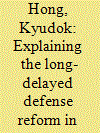

|
|
|
|
|
| Summary/Abstract |
This study explains why defense reform efforts in South Korea have failed to achieve substantial progress. The outcome would seem all the more unexpected because the Blue House has ostensibly wanted comprehensive defense reform, while the Korean military is also highly motivated to upgrade itself to be able to fight and defend itself against North Korea, which has continuously threatened to use nuclear weapons preemptively. How should we account for this puzzle? This study focuses on three factors to explain the absence of reform: the role of the president, the opposition from the armed forces leadership, and lapses in the civilian control of the military. This study concludes that South Korea needs to revitalize the reform process in order to successfully confront the security challenges of the twenty-first century. Defense reform has long been dominated by the military leaders. It has resulted in the unwanted situation where civilian leaders have been alienated. Ironically, lack of interest among civilian leaders leads to the lack of support from outside. In order to achieve successful defense reform, assistance from the outside must be guaranteed. South Korea needs to readjust goals and prepare for building robust armed forces to play a decisive role in achieving the mission to meet the requirements of changing strategic environments. The Park administration also needs to take timely steps to overcome its own vulnerabilities, such as modifying its doctrine, equipment, training, and culture. Elimination of its vulnerabilities may involve changes in philosophy, tactics and possibly even modifications to the concepts of operations. All can entail substantial costs. However, the cost of not dealing with the threats is likely to be much higher.
|
|
|
|
|
|
|
|
|
|
|
|
|
|
|
|
| 3 |
ID:
147392


|
|
|
|
|
| Summary/Abstract |
The article investigates the extent to which the European Union has contributed
to the enhancement of Poland’s security. It achieves this through the analysis of
various instruments of the EU within the Common Foreign and Security Policy in
order to determine how (or if) they influenced Poland’s security policy. After the
accession to NATO and the EU, Poland could not find its next strategic objective
and was gradually losing its position as a leader in the region. Without national
interests clearly defined, it is difficult to benefit from the opportunities the EU is
presenting to its members, even if these opportunities are limited. The greatest
problem is going from one extremum to the other with the shift of power between
the two main opposing political parties––Civic Platform and Law and Justice.
|
|
|
|
|
|
|
|
|
|
|
|
|
|
|
|
| 4 |
ID:
147393
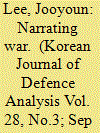

|
|
|
|
|
| Summary/Abstract |
Since the 2000s Japan’s defense and security policy has undergone a historic shift, including a series of military expansions, the government’s 2014 approval of a reinterpretation of Article 9 of the postwar Constitution, and the Diet’s passage of security bills in 2015. This poses a question regarding how it was possible for all these changes to occur, if the long-held domestic norm of antimilitarism had persisted. This article examines Japan’s domestic normative context between 2001 and 2013 by analyzing the discursive constructions of Japanese war memory by editorials of two representative newspapers, Yomiuri Shimbun and Asahi Shimbun. It is found that Yomiuri supports the shift for military expansions as compatible with the postwar stance of a pacifist nation with the interpretation that the Japanese war contributed to independence movements in Asia. This is contrasted with Asahi, which opposes the change with a view that Japan’s war was an aggression. This article argues that the emerging discursive practices represented by Yomiuri produced the normative context that appealed to the distinctive target audience in such a way to operate as a precondition for the Japanese government to shift its defense and security policy. This raises the importance of the domestic factor in understanding Japan’s momentous changes in security, adding more nuances to the conventional focus on external factors.
|
|
|
|
|
|
|
|
|
|
|
|
|
|
|
|
| 5 |
ID:
147397
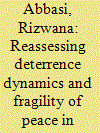

|
|
|
|
|
| Summary/Abstract |
This study reassesses conflicting strategic behavior of India and Pakistan in the changed regional environment. It predominantly focuses on evaluating the two states’ behavior in regard to their nuclear doctrines, strategies, force postures and, operational plans and their impact on deterrence stability/instability. It continues by examining the following questions: Why do these states behave distinctly on their strategic goals that make peace precarious and deterrence unstable? How far have the changing security dynamics and emerging doctrinal structures of these states made regional deterrence more or less stable? How can these states stabilize deterrence and secure regional peace? The paper finds that nuclear deterrence in South Asia apparently has stabilized the region but the peace was precariously maintained because the two states have distinct strategic direction and goals. India and Pakistan cannot avoid serious and unavoidable risks of nuclear war until they lay down their all-inclusive military plans, adopt budgetary constraints, institute an arms control mechanism and build a stable political relationship.
|
|
|
|
|
|
|
|
|
|
|
|
|
|
|
|
| 6 |
ID:
147396
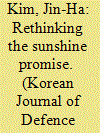

|
|
|
|
|
| Summary/Abstract |
North Korea conducted its fourth nuclear test in January 2016. It seemed to nullify Sunshine Policy, the policy idea that South Korea’s economic assistance can induce North Korea’s post-communist reform and opening, and, in turn, promote interKorean peace. The primary purpose of this article is to identify the structural causes of the failure of these inducement policies, while seeking potential remedies. The argument is that South Korean assistance policies have not managed to effectively accomplish the intended outcomes because of the patrimonial domination of North Korean rent-seeking elites and the under-provision of policy harmonization among engaged donors. First, the patrimonial domination, substantially free of institutions of accountability, matters. Second, the lack of international harmonization among engaged donors’ policy goals decreases aid effectiveness, which seems to worsen the problem of politicized aid. In the event that North Korea changes its policy directions to meet the international demands of denuclearization, this article suggests the institutionalization of a multinational consortium to promote policy harmonization among engaged donors and to lower the structural impediments raised by the North Korean ancien régime as well.
|
|
|
|
|
|
|
|
|
|
|
|
|
|
|
|
| 7 |
ID:
147395


|
|
|
|
|
| Summary/Abstract |
This article examines some of the many challenges facing Russia’s defense industrial sector as it tries to compete abroad under new circumstances and focuses to a considerable degree on its ties to Asian countries, mainly China. It also seeks to prove that Russia exports weapons mainly for reasons of gaining foreign policy standing and influence and for securing rents for elite corruption. But it also examines some domestic and other foreign issues as well. Those issues pertain to the quality of Russian exports, the fact that competition is rising in this sector, and among other things the rising dependence of Russia on China for political and economic support. Russia’s growing inclination to China may also cost it markets in other places like Vietnam.
|
|
|
|
|
|
|
|
|
|
|
|
|
|
|
|
| 8 |
ID:
147398
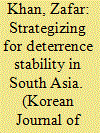

|
|
|
|
|
| Summary/Abstract |
Before the arrival of nuclear weapons in South Asia, both India and Pakistan had fought several wars. The arrival of nuclear weapons has made both the South Asian nuclear weapons states more cautious to fight. This caution and restraint is directly associated with the fear of using nuclear weapons, the damage of which remains unacceptable to both the adversaries. Although nuclear weapons are considered for deterrence purposes and they are assumed to provide deterrence stability, they are not a guaranteed panacea for all the outstanding issues including the core issue of Kashmir. This absence of a guaranteed solution for these problems despite the presence of nuclear weapons entails the deterrence instability in South Asia, even though neither India nor Pakistan are directly fighting anymore because of the fear of major military escalation to a nuclear use. This paper talks about at least three major dynamics associated with nuclear weapons that might help promote deterrence stability in South Asia. It asks for the consistent practice of minimum deterrence that was initially conceptualized, focuses on the practices of defensive doctrinal postures between India and Pakistan, and calls for an arms control regime (ACR) that does not yet exist in South Asia. In addition to other peaceful measures discussed in the existing literature, the amalgamation of these three ingredients and the commonalities within them could play an important role in promoting deterrence stability in South Asia.
|
|
|
|
|
|
|
|
|
|
|
|
|
|
|
|
|
|
|
|
|